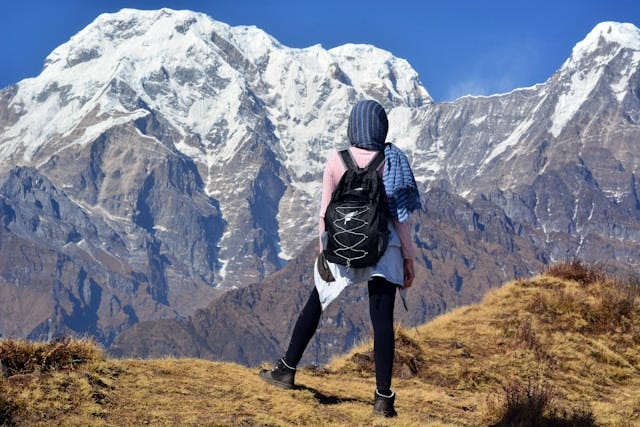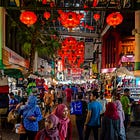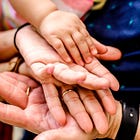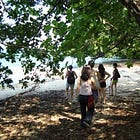
My obsession with traveling began during my first sabbatical break, venturing through China, Mongolia, and Nepal. Lucky for me, I started my maiden backpacking with a good friend, who is a veteran himself. He showed me the ropes and, most importantly, how to scrimp in every way possible to stretch the money to travel as long as possible. Little did I know then, this manner of scrimping brought with it many experiences with the locals and nature that I wouldn’t trade for any amount of money in the world.
Also, traveling with a frugal mindset inadvertently aligned with eco-conscious practices, even before such considerations became a conscious part of my travel ethos. It was a serendipitous discovery that traveling this way made it sustainable.
My first destination was China, and I was surprised to find it differed greatly from my expectations as a Malaysian with Chinese heritage. I was shocked to discover that China was not at all the “Chinese” I thought it should be. Despite some similarities, decades of change separated me from my grandparents’ China.
During the three-day journey on the Trans-Siberian train from China to Mongolia, without once disembarking, I found the opportunity to reflect deeply on life, particularly my own. Surrounded by endless expanses of emptiness, contrasting with the crowded scenes of China I had recently experienced, I came to the realization that many of my preconceived notions about life and individuality were merely illusions.
Then I explored the vast landscapes of Mongolia, where legend says more horses than humans roam, and had the awe-inspiring trek through Mongolia’s deserts and the surreal experience of witnessing the sunrise turn the sand golden. When I thought I could not top this experience, I trekked the Annapurna Circuit in Nepal after that. My experience there was too profound to summarize here, so I shall keep that for another letter on another day.
In summary, after this three-month sabbatical of travel, from wading through masses of people in China to exploring the empty vast lands of Mongolia to trekking to the top of the world in Nepal, it's safe to say that I was transformed. Not only have I caught the travel bug, but I've also rediscovered my true self. The same curious ten-year-old pondered life's mysteries before becoming lost in the indoctrination of education and work.
Why travel?
When I talk about travel here, I talk about slow and deep travel. A 7 days holiday in a resort is not going to cut it. It should be many days on the road living close to how the locals live in a country. In my experience, if you have the luxury, 30 days is just about right to fully immerse in a country, to at least feel you know a little about it, from a visitor’s perspective.
I travel because it is the one way to take me out of my daily life, not because there is anything wrong with it, but because it can engage me with the world at large more actively. It brings forth our conscious mind via awe moments or simply being alert due to foreign and hopefully interesting environment.
One is often in the here and now when experiencing and discovering new things, especially if it is out of the usual paradigm or condition. Like the time I was thrust into Kathmandu and was swept away by a flood of sensory experiences: the city’s vibrant, haphazard architecture, its market buzzing with life, streets echoing with relentless honkings, and the air thick with the myriad spices that filled every single breath.
Traveling solo and as a woman also encourages me to be constantly conscious and curious. It also encouraged me, this introvert, to connect with other fellow travelers while fueling my encounters with the locals, the former due to shared commons and the latter due to shared curiosity because of differences.
Being alone on the road, I have to put my trust out there with the people and the world. With this, I was rewarded with countless memorable and pleasant encounters. These beautiful encounters with the locals proved to me that despite the seeming differences we all have, we are all but the same - we are just doing our best with what we have to live the life we want.
Traveling also exposed me to cultures and mindsets different from mine, even if it is one ancestors’ cultures in China; there are many things to learn and discover. In the process, we can recognize and respect the “ways of being” that are not our own. As Nolan Yuma said, slow travel increases our empathy and understanding of others and opens us up to a universal bond that we can only hope to articulate through art.
Should everyone travel?
“Everyone should get out of their comfort zone and daily lives and experience the road at least once in their lives,” I used to preach to my friends, much to their chagrin. Later, I learned this allure of traveling is not for everyone, and for those that are, it may not be a priority among so many other things life demands of us.
As for myself, I have recently come to a conundrum - how does travel fit with the eco-consciousness? Back then, when I was deeply in love with traveling, this was not even on my mind. Now, almost a decade later, since I stopped traveling actively because, yes, I “settled down” - got married and made two little people, and the eco-conscious movement has been going strong ever since, I cannot, sadly, in good conscience, “just travel” anymore.
As a backpacker back then, apart from the biggest eco-footprint of flying, we are one of the eco-friendly travelers. We usually stay in hostels, sharing rooms with many, and take the bus with the locals, who are already going anyway and rarely take any special tours, trips, or domestic flights. Everyone should travel a little bit like the backpackers. Of course, I see that it is not always possible; I don’t think my toddler nor the other guests will enjoy sleeping in a dorm together.
So, should everyone travel? Should anyone travel at all?
I still think we should, despite these concerns, because of all the goodness it brings to the traveler and, to some extent the world, makes it worth it. But we need to travel even more slowly now, more consciously and aware of our choices and their impact on the world.
How to travel less but more?
When the time comes, and my kids are finally old enough to enjoy real slow and deep traveling with me, I am considering the first options of exploring the nearby countries, preferably on a train, and then, if needed, the car, before flying. And if it must be, there should only be one round-trip flight; domestically, we should use land travel whenever possible and not try to see everything.
When we travel, we should go deep, rather than skimming across the surface, staying in one/few places for an extended time. This would mean sacrificing some dream of ticking off multiple attractions in one go or the need to flock to a beach with the rest of Europe before winter kicks in. This would mean planning around all that to properly experience one place and, in some ways, give back to the community that lives there.
We should connect with the local people; travel is a two-way street, says Judith Fein. Sustainable travel extends beyond reducing carbon footprints; it involves immersing in local communities, supporting local businesses, and minimizing our environmental impact by staying longer and traveling more thoughtfully.
Keep traveling
There are many reasons to travel for many people, but for me, it is the journey that counts, not the destination. The great affair is to move, explore, and be on the open road. The essence is the connections forged and the reminder that we are all travelers through life, seeking meaning, connection, and a sense of belonging in this vast, beautiful world. Suppose we treasure the journey more than the destination; there will be less flying around ticking off the attractions list, paradoxically reducing one’s carbon footprint, as it does mean more real slow footprints on the road.
My maternal grandfather is a Hakka, which means “Guest People” in Chinese; historically, they are nomads, and I often wonder if his nomadic blood is running through me. I can make a very good nomad; I enjoy and adapt very well to ever-changing landscapes and ways of living. Despite being unable to connect with my ancestral culture in China, I carry with me this wanderlust gift from them, which has fueled me in my slow travels and will continue to compel me until I return on the road again.
As I pass on this wanderlust gift to my children, I ponder how I can draw from my heritage and experiences to teach them to explore the world - to be mindful and conscious in their lives and travels, to connect with people genuinely and respectfully, and be keenly aware of the footprints that they will leave behind.
More from my personal essays:







You are so much braver and more adventurous than I was at your age. When I was studying in Perth, i didn't take advantage of my time there to travel cos I was afraid of traveling alone 🤡
Fortunately, work pushed me out of my hidey hole. I ended up traveling work on company ticket; Japan, China, England, the US. It definitely opened my eyes to what I wanted in live and to question my preconceived notions about countries and the people.
I was fortunate to visit China during various stages of her development. I was there to personally witness her growth from underdeveloped nation to a wildly developed one.
Now, I have to admit that I am quite a homebody (due to not traveling very well due to being fatigued easily) but I have a thirst to explore China and may do so soon.
Maybe I should visit once again, as you say it has various stages of development, it's mostly different again now from when I was there! Do share some stories once you visited there.